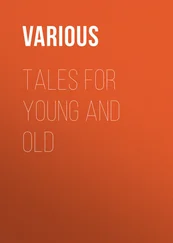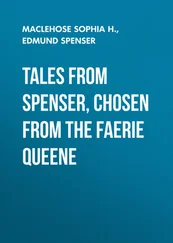Various - Tales from Many Sources. Vol. V
Здесь есть возможность читать онлайн «Various - Tales from Many Sources. Vol. V» — ознакомительный отрывок электронной книги совершенно бесплатно, а после прочтения отрывка купить полную версию. В некоторых случаях можно слушать аудио, скачать через торрент в формате fb2 и присутствует краткое содержание. Жанр: Сказка, foreign_antique, foreign_prose, на английском языке. Описание произведения, (предисловие) а так же отзывы посетителей доступны на портале библиотеки ЛибКат.
- Название:Tales from Many Sources. Vol. V
- Автор:
- Жанр:
- Год:неизвестен
- ISBN:нет данных
- Рейтинг книги:5 / 5. Голосов: 1
-
Избранное:Добавить в избранное
- Отзывы:
-
Ваша оценка:
- 100
- 1
- 2
- 3
- 4
- 5
Tales from Many Sources. Vol. V: краткое содержание, описание и аннотация
Предлагаем к чтению аннотацию, описание, краткое содержание или предисловие (зависит от того, что написал сам автор книги «Tales from Many Sources. Vol. V»). Если вы не нашли необходимую информацию о книге — напишите в комментариях, мы постараемся отыскать её.
Tales from Many Sources. Vol. V — читать онлайн ознакомительный отрывок
Ниже представлен текст книги, разбитый по страницам. Система сохранения места последней прочитанной страницы, позволяет с удобством читать онлайн бесплатно книгу «Tales from Many Sources. Vol. V», без необходимости каждый раз заново искать на чём Вы остановились. Поставьте закладку, и сможете в любой момент перейти на страницу, на которой закончили чтение.
Интервал:
Закладка:
"I hope we know what is due to ourselves, and to the estate—small, as it is—sir," said Miss Betty, "as well as to Providence, too well to attempt to raise any child, however handsome, from that station of life in which he was born."
"Bless me, madam! I never dreamed you would adopt a beggar child as your heir; but I hope you mean to send it to the workhouse, if the gipsy tramps it belongs to are not to be found?"
"We have not made up our minds, sir, as to the course we propose to pursue," said Miss Betty, with outward dignity proportioned to her inward doubts.
"My dear ladies," said the lawyer anxiously, "let me implore you not to be rash. To adopt a child in the most favorable circumstances is the greatest of risks. But if your benevolence will take that line, pray adopt some little boy out of one of your tenants' families. Even your teaching will not make him brilliant, as he is likely to inherit the minimum of intellectual capacity; but he will learn his catechism, probably grow up respectable, and possibly grateful, since his forefathers have (so Miss Kitty assures me) had all these virtues for generations. But this baby is the child of a heathen, barbarous, and wandering race. The propensities of the vagabonds who have deserted him are in every drop of his blood. All the parsons in the diocese won't make a Christian of him, and when (after anxieties I shudder to foresee) you flatter yourself that he is civilized, he will run away and leave his shoes and stockings behind him."
"He has a soul to be saved, if he is a gipsy," said Miss Kitty, hysterically.
"The soul, my dear Miss Kitty "—began the lawyer, facing round upon her.
"Don't say anything dreadful about the soul, sir, I beg," said Miss Betty, firmly. And then she added in a conciliatory tone, "Won't you look at the little fellow, sir? I have no doubt his relations are shocking people; but when you see his innocent little face and his beautiful eyes, I think you'll say yourself that if he were a duke's son he couldn't be a finer child."
"My experience of babies is so limited, Miss Betty," said the lawyer, "that really—if you'll excuse me—but I can quite imagine him. I have before now been tempted myself to adopt stray—puppies, when I have seen them in the round, soft, innocent, bright-eyed stage. And when they have grown up in the hands of more credulous friends into lanky, ill-conditioned, misconducted curs, I have congratulated myself that I was not misled by the graces of an age at which ill-breeding is less apparent than later in life."
The little ladies both rose. "If you see no difference, sir," said Miss Betty in her stateliest manner, "between a babe with an immortal soul and the beasts that perish, it is quite useless to prolong the conversation."
"Reason is apt to be useless when opposed to the generous impulses of a sex so full of sentiment as yours, madam," said the lawyer, rising also. "Permit me to take a long farewell, since it is improbable that our friendship will resume its old position until your protegé has—run away."
The words "long farewell" and "old friendship" were quite sufficient to soften wrath in the tender hearts of the little ladies. But the lawyer had really lost his temper, and, before Miss Betty had decided how to offer the olive branch without conceding her principles he was gone.
The weather was warm. The little ladies were heated by discussion and the parson by vain scouring of the country on foot, when they asked his advice upon their project, and related their conversation with the lawyer. The two gentlemen had so little in common that the parson felt it his duty not to let his advice be prejudiced by this fact. For some moments he sat silent, then he began to walk about as if he were composing a sermon; then he stopped before the little ladies (who were sitting as stiffly on the sofa as if it were a pew) and spoke as if he were delivering one.
"If you ask me, dear ladies, whether it is your duty to provide for this child because you found him, I say that there is no such obligation. If you ask if I think it wise in your own interests, and hopeful as to the boy's career, I am obliged to agree with your legal adviser. Vagabond ways are seldom cured in one generation, and I think it is quite probable that, after much trouble and anxiety spent upon him, he may go back to a wandering life. But, Miss Betty," continued the parson in deepening tones, as he pounded his left palm with his right fist for want of a pulpit, "If you ask me whether I believe any child of any race is born incapable of improvement, and beyond benefit from the charities we owe to each other, I should deny my faith if I could say yes. I shall not, madam, confuse the end of your connection with him with the end of your training in him, even if he runs away, or fancy that I see the one because I see the other. I do not pretend to know how much evil he inherits from his forefathers as accurately as our graphic friend; but I do know that he has a Father whose image is also to be found in His children—not quite effaced in any of them—and whose care of this one will last when yours, madam, may seem to have been in vain."
As the little ladies rushed forward and each shook a hand of the parson, he felt some compunction for his speech.
"I fear I am encouraging you in grave indiscretion," said he. "But, indeed, my dear ladies, I am quite against your project, for you do not realize the anxieties and disappointments that are before you, I am sure. The child will give you infinite trouble. I think he will run away. And yet I cannot in good conscience say that I believe love's labour must be lost. He may return to the woods and wilds; but I hope he will carry something with him."
"Did the reverend gentleman mean Miss Betty's teaspoons?" asked the lawyer, stroking his long chin, when he was told what the parson had said.
The matter of the baby's cap disturbed the little ladies. It seemed so like the beginning of a fulfilment of the lawyer's croakings.
Miss Kitty had made it. She had never seen a baby without a cap before, and the sight was unusual if not indecent. But Miss Kitty was a quick needlewoman, and when the new cap was fairly tied over the thick crop of silky black hair, the baby looked so much less like Puck, and so much more like the rest of the baby world, that it was quite a relief.
Miss Kitty's feelings may therefore be imagined when, going to the baby just after the parson's departure, she found him in open rebellion against his cap. It had been tied on whilst he was asleep, and his eyes were no sooner open than he commenced the attack. He pulled with one little brown hand and tugged with the other; he dragged a rosette over his nose and got the frills into his eyes; he worried it as a puppy worries your handkerchief if you tie it around its face and tell it to "look like a grandmother." At last the strings gave way, and he cast it triumphantly out of the clothes-basket which served him for cradle.
Successive efforts to induce him to wear it proved vain, so Thomasina said the weather was warm and his hair was very thick, and she parted this and brushed it, and Miss Kitty gave the cap to the farm-bailiff's baby, who took to it as kindly as a dumpling to a pudding-cloth.
How the boy was ever kept inside his christening clothes, Thomasina said she did not know. But when he got into the parson's arms he lay quite quiet, which was a good omen. That he might lack no advantage, Miss Betty stood godmother for him, and the parish clerk and the sexton were his godfathers.
He was named John.
"A plain, sensible name," said Miss Betty. "And while we are about it," she added, "we may as well choose his surname. For a surname he must have, and the sooner it is decided upon the better."
Читать дальшеИнтервал:
Закладка:
Похожие книги на «Tales from Many Sources. Vol. V»
Представляем Вашему вниманию похожие книги на «Tales from Many Sources. Vol. V» списком для выбора. Мы отобрали схожую по названию и смыслу литературу в надежде предоставить читателям больше вариантов отыскать новые, интересные, ещё непрочитанные произведения.
Обсуждение, отзывы о книге «Tales from Many Sources. Vol. V» и просто собственные мнения читателей. Оставьте ваши комментарии, напишите, что Вы думаете о произведении, его смысле или главных героях. Укажите что конкретно понравилось, а что нет, и почему Вы так считаете.












